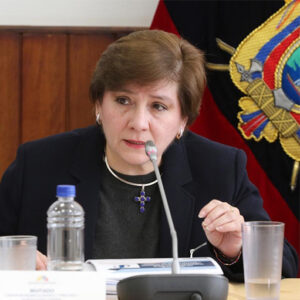Ecuador’s Superintendencia de Bancos (SB), which recently celebrated its 94th anniversary, is the new vice chair of AFI’s Financial Inclusion Initiative for Latin America and the Caribbean (FILAC), a regional initiative launched in 2016 as a driving force for advancing financial inclusion in Latin American and Caribbean countries. In part one of our interview with Ruth Arregui, the head of the superintendency, we look at the challenges facing LAC countries, where the regional initiative headed in the next two years and the role of the banking sector in driving financial inclusion.

AFI: Congratulations on your new post as vice chair of FILAC!
Arregui: Thank you for the congratulations! SB feels very honored by this appointment. It reaffirms our commitments to our work in financial inclusion with the assurance that we will further strengthen coordination and cooperation between AFI member institutions at the regional level.
AFI: In this new role, which priority policy areas do you see as crucial for strengthening financial inclusion in Latin America and the Caribbean (LAC) over the next two years?
Arregui: FILAC seeks to promote inclusive and sustainable growth and poverty reduction by strengthening capacities that support the implementation of financial inclusion policies in LAC. Along these lines, the priority areas that have been agreed with FILAC members focus on policies that promote the financial education and consumers protection, improve digital financial services and make key statistics available for monitoring and evaluating financial inclusion.
Financial inclusion improves the wellbeing of people when they access and use products and services in the formal financial system. Consequently, to promote financial inclusion and wellbeing in LAC countries, challenges relating to the access and use of financial services must be addressed and developed in parallel with financial education and financial consumer protection.
AFI: What other factors must be considered?
We, as FILAC members, also agree on the need to incorporate a gender-based approach across all strategies and policy actions to achieve more inclusive and comprehensive results that promote collective well-being with an emphasis on the most vulnerable groups. Financial inclusion has a greater impact when we include groups that have been historically excluded due to poverty, informality, geography, gender, income or disability.
AFI: How about challenges and solutions? What are the main ones for financial inclusion in LAC region?
Arregui: On the demand side, challenges are concentrated in large segments of the population that are located far away from financial services. These groups have limited access to credit, low capacity and productivity and greater vulnerability to risks associated with rural marginal sectors, such as poverty, distrust in the financial sector and limited education, technological and financial capacities.
As for the supply side, there is a lack of motivation among financial institutions to improve the provision of financial services to vulnerable consumers due to limited profitability and greater risks linked to irregular incomes. Thus, a major challenge focuses on changing the paradigm of banks so that they perceive financial inclusion as a business opportunity.
AFI: What can the banking sector do to support financial inclusion?
Although the banking system has contributed to financial inclusion, greater depth and scope is needed on several fronts. This includes access to infrastructure, the supply of financial services, the banking of excluded populations and the protection of financial consumers.
Financial entities must take on these challenges. They must also enhance their understanding of financial services demand by implementing innovative strategies that tailor designs to meet the needs of the most excluded population segments. For this, they must also understand why low-income consumers do not use formal financial services.
With the adoption of improved technological innovations, it is also essential to increase the innovative capacity of financial institutions so that they are motivated to include populations that are either excluded or do not receive enough services.
Supervisory and control institutions must focus on identifying the best ways to incorporate innovative technologies into the financial sector in a responsible, transparent and competitive manner. Data and statistics must, therefore, be available to determine the importance, scope and monitoring of financial technology.
This will also encourage financial institutions to conduct business without undermining consumer protection, equal conditions, the integrity of financial markets or the stability of the financial system.
AFI: How would these changes benefit the financial sector?
Challenges lead to opportunities. Among them is the migration to new agile, safe and accessible payment systems that promote transparency, reduce corruption and lower transaction costs.
Challenges must be addressed from the central idea of generating greater confidence in the financial sector as well as greater empowerment and education among financial consumers with an emphasis on excluded groups or those who possess greater distrust in formal financial systems.
AFI: SB is one of AFI’s newest members, having joined in 2020. What will the next two years bring in terms of collaborating with the network as vice chair of FILAC?
Arregui: As vice chair of FILAC, SB will work closely with AFI and its member institutions to develop spaces and products that contribute to the formulation of financial inclusion policies that are applicable to countries within LAC. For this, we wish to harness various perspectives from LAC countries that promote the deepening of financial inclusion policy and regulation and support their implementation.
Our efforts will look at identifying the main barriers and limitations of financial inclusion policies in the region. Spaces for the exchange of best experiences and lessons learned regarding financial inclusion policies will be promoted with the support of AFI’s wide network and discussions will be facilitated with their main actors. These efforts seek to strengthen and support the implementation of financial inclusion policies in LAC countries and impact the wellbeing of their inhabitants.
So far, SB has contributed directly to AFI by fulfilling a work plan to generate vital information on policies and regulations that can be applied in LAC countries related to bringing the informal sector and migrant populations onboard and developing an approach that emphasizes inclusive green finance.

 About
About
 Online
Online
 Data
Data



















